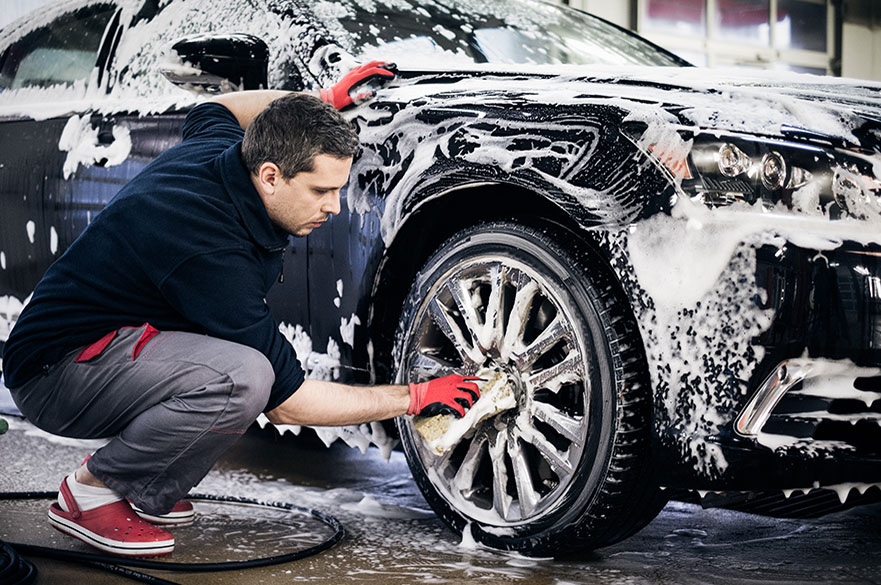New research reveals hand car wash sector is awash with exploitation
The risk of slavery in hand car washes across the UK has been exposed by new data from Nottingham Trent University (NTU) and modern slavery charity, The Clewer Initiative. It reveals a prevalence of indicators that make exploitation and slavery more likely.

Researchers at NTU had expected to be able to segment the hand car wash sector and identify businesses that were more or less likely to use unlawful and potentially criminal modern slavery practices on their sites.
However, their analysis – which coincides with the sixth anniversary of The Clewer Initiative’s Safe Car Wash App - reveals that the correlation between the location of a hand car wash and the presence of slavery is not strong enough to eliminate any specific business and the risk is everywhere. Therefore, consumers and police officers in every community need to be vigilant to spot the signs of slavery and other unlawful behaviour – no hand car wash is immune.
This deep dive into the endemically unlawful and under-regulated sector:
- Connected the current data on hand car wash locations held by The Clewer Initiative’s Safe Car Wash App and NTU’s research data
- Enabled the team to model the type of neighbourhood where a hand car wash business is likely to be located
- Explored the type of neighbourhoods where you are more likely to find a hand car wash business which has been reported through the App as showing warning signs of exploitation and slavery
- Highlighted that more than 90% of hand car washes are likely to be employing workers illegally, without proper pay, records, PPE or first aid measures
- Created a visual map for police and other agencies to use to understand where the greatest threat of modern slavery could occur.
Dr James Hunter, centre co-director and researcher at NTU’s Work, Informalisation and Place Research Centre, explains: “By combining data from The Clewer Initiative’s Safe Car Wash App and Nottingham Trent’s Work, Informalisation and Place Research Centre (WIP), we have identified a number of drivers that increase the likelihood of exploitation being present. For example, there is a 2.2 times greater chance of finding exploitation in a hand car wash in a neighbourhood containing a vehicle repairs business and a 1.75 times greater chance of finding exploitation in a hand car wash in a neighbourhood with a petrol station.
“However, the variation between our original model and the Safe Car Wash App based analysis is statistically small and leads us to conclude that, in reality, modern slavery and exploitation can occur in any business. This is more worrying than if there had been a particular pattern. No community, consumer or police force can take their eye off the ball.”
Rich Pickford of WIP adds: “When The Responsible Car Wash Scheme attempted to introduce a Code of Practice, hardly any hand car washes met all the criteria. The entire sector is endemically unlawful and non-compliant. Our work through the Home Office’s Modern Slavery Prevention Fund also highlighted the scale of non-compliance and unlawful practice across three local authorities in the UK.”
Caroline Virgo, director of The Clewer Initiative, concludes: “Statutory organisations are already stretched and yet our data proves no community is immune from modern slavery. The risk is everywhere. We need many more consumers to use the Safe Car Wash App and submit their reports so we can provide more detailed insight to the Police and GLAA. A large number of police forces across the country use the data from the Safe Car Wash App to inform their investigations and so the more intelligence we can triage for them, the more effective their policing will be. To mark the sixth birthday of the Safe Car Wash App, we are calling on consumers to download the app and submit reports every time they visit a hand car wash. We are reliant on the general public to be our eyes and ears and drive out exploitation across the sector.
“Working with WIP researchers has confirmed our suspicions about modern slavery and provides additional weight to our belief that we must tackle modern slavery across the UK.
Since the launch of the Safe Car Wash App in June 2018, it has been downloaded 40,000 times. Reports that score over the threshold of concern for modern slavery and exploitation are referred to Modern Slavery Helpline and passed on to the Police where appropriate. The data from the App has enabled law enforcement agencies to follow-up on numerous businesses that may be exploiting their workers.
-
Notes for editors
Press enquiries please contact Helen Breese, Public Relations Manager, on telephone +44 (0)115 848 8751, or via email.
Or
Claire Walford, Press Officer at The Clewer Initiative, Tel: + 44 (0)7833 458 985 or via email: claire.walford@churchofengland.org,
The Clewer Initiative
The Clewer Initiative was launched in 2016 as the Church of England’s response to modern slavery. The Clewer Initiative exists to mobilise the Church and communities to take action against exploitation and modern slavery. We aim to share learning and signpost best practice amongst our partners. The Clewer Initiative works in varying ways with the Church of England’s 42 dioceses. www.theclewerinitiative.org
Nottingham Trent University
Nottingham Trent University (NTU) received the Queen’s Anniversary Prize for Higher and Further Education in 2021 for cultural heritage science research. It is the second time that NTU has been bestowed the honour of receiving a Queen’s Anniversary Prize for its research, the first being in 2015 for leading-edge research on the safety and security of global citizens.
The Research Excellence Framework (2021) classed 83% of NTU’s research activity as either world-leading or internationally excellent. 86% of NTU’s research impact was assessed to be either world-leading or internationally excellent.
NTU was awarded The Times and The Sunday Times Modern University of the Year 2023 and ranked University of the Year in the Whatuni Student Choice Awards 2023. It was awarded Outstanding Support for Students 2020 (Times Higher Education Awards), University of the Year 2019 (Guardian University Awards, UK Social Mobility Awards), Modern University of the Year 2018 (Times and Sunday Times Good University Guide) and University of the Year 2017 (Times Higher Education Awards).
NTU is the 5th largest UK institution by student numbers, with approximately 40,000 students and more than 4,400 staff located across five campuses. It has an international student population of 7,000 and an NTU community representing over 160 countries.
Since 2000, NTU has invested £570 million in tools, technology, buildings and facilities.
NTU is in the UK’s top 10 for number of applications and ranked first for accepted offers (2021 UCAS UG acceptance data). It is also among the UK’s top five recruiters of students from disadvantaged backgrounds and was the first UK university to sign the Social Mobility Pledge.
NTU is ranked the second most sustainable university in the world in the 2022 UI Green Metric University World Rankings (out of more than 900 participating universities).
- Category: Press office; Research; School of Social Sciences


